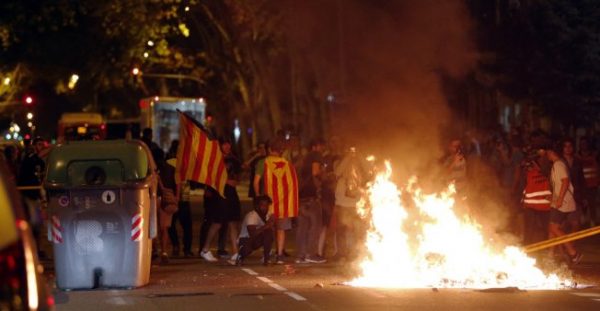
A year after a banned referendum on secession from Spain, tens of thousands of Catalan protesters piled pressure on the region’s separatist government Monday during an anniversary marked by road and rail blockades and late-night clashes with police.
According to municipal police, 180,000 protesters gathered in Barcelona late in the day behind a banner reading “October 1, no forgetting, no forgiving”, to push for independence at a demonstration called by the influential civic association ANC.
“We’re disappointed because people are pushing things as much as they can but they (politicians) aren’t responding,” Francesc Serra, a 43-year-old gardener, told AFP.
At the end of the demonstration, clashes erupted late Monday between separatists and the regional police forces, with protesters — some with their faces covered — throwing stones at officers who responded by charging.
Hundreds of protesters managed to knock down barriers at the entrance of the regional parliament just after 21:00 local time (1900 GMT).
Earlier in the day, some 500 people cut the main roads of the city and called for the resignation of regional president Quim Torra, a staunch independence supporter whom they nonetheless accuse of failing to stand up to the Spanish state.
“We want to show them that they are where they are thanks to the people and that we have the power,” explained Ana Sarabia, 48.
“If they don’t do anything, we will act,” she told AFP at the demonstration.
Several hundred members of a radical group called the Committees for the Defence of the Republic (CDRs), many covering their faces with scarves, had occupied high-speed railway tracks in the northeastern city of Girona early Monday, briefly blocking service between Figueres and Barcelona.
Central streets in Barcelona and Lleida were blocked, as was the AP-7 motorway south of Barcelona, and the A2 that links the city with Madrid, Catalan TV images showed.
Activists swarmed into Catalonia’s regional government building in Girona and took down the Spanish flag that hangs out front, replacing it with a red, yellow and blue separatist flag.
“A year ago we voted for independence… Let’s act,” the CDRs tweeted.
Rift
Last year’s secession bid, which saw Catalan leaders hold the referendum despite a court ban on October 1, 2017 and then declare short-lived unilateral independence on October 27, has polarised public opinion, cleaving deep divisions regarding the region’s future.
Monday’s acts of disobedience highlighted divisions among separatists in the wealthy northeastern region, which is home to 7.5 million people and has its own language.
Separatist parties that hold an absolute majority in the regional parliament are split on how to pursue a break from Spain — either through direct confrontation or via a more moderate approach.
On Saturday, Barcelona was already tense, with 24 people injured and six detained as separatists clashed with Catalan police.
They had taken part in a protest called to counter a rally by police paying tribute to colleagues who deployed to foil the Catalan independence referendum.
The far-left separatist CUP party subsequently asked for the resignation of regional interior minister Miquel Buch, who had called out the independence protesters over the violence.
In this context of sharp divisions, Torra on Monday praised the CDR actions, saying they were “doing well in putting on the pressure.”
Spanish Foreign Minister Josep Borrell, who is Catalan, retorted however that “maintaining public order is the responsibility of Torra and the Catalan regional government.”
‘Damaged Spain’s reputation’
The independence referendum last year was marred by a violent police crackdown on polling stations that made headlines around the world.
A majority voted for independence, but turnout was low as opponents stayed away.
In a radio interview, the spokeswoman for the Socialist government in Madrid, Isabel Celaa, said the referendum had been “illegal” and had no “legal consequence”.
But she said the sporadically violent police intervention to impede the vote — as ordered by Spain’s then conservative government — was a mistake.
Celaa said the footage of police charging at voters — even if some of it was later found to be false — “seriously damaged Spain’s reputation”.
After the Catalan government declared unilateral independence on October 27, Madrid swiftly sacked the Catalan government, prompting several key figures to flee abroad, including Puigdemont. Others were jailed.
In total, 13 separatist leaders have been charged with rebellion, nine of whom are in preventative custody in Spain awaiting trial, while four others are in self-exile in Belgium, Scotland and Switzerland.
(AFP)

Leave a Reply
You must be logged in to post a comment.